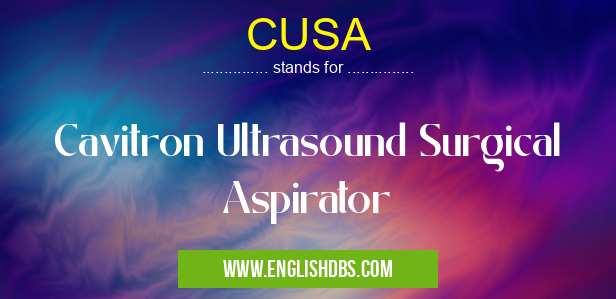What does CUSA mean in SURGICAL
CUSA stands for Cavitron Ultrasound Surgical Aspirator. It is an innovative medical device that combines the features of ultrasonic technology and surgical aspiration to provide surgeons with improved efficiency, accuracy, and safety in a wide variety of procedures. CUSA is commonly used in the areas of neurosurgery, plastic surgery, otolaryngology, cardiothoracic surgery, urology, ophthalmology, dentistry and veterinary medicine. It is capable of producing highly precise cutting vibrations while simultaneously aspirating fluids or tissue. Such controlled technique allows for greater precision during surgery and reduced risk of patient trauma or other complications. With its unique combination of benefits, CUSA has found success in many types of medical settings worldwide.

CUSA meaning in Surgical in Medical
CUSA mostly used in an acronym Surgical in Category Medical that means Cavitron Ultrasound Surgical Aspirator
Shorthand: CUSA,
Full Form: Cavitron Ultrasound Surgical Aspirator
For more information of "Cavitron Ultrasound Surgical Aspirator", see the section below.
Description
CUSA utilizes high-speed ultrasonic vibrations which are applied to the surface of tissues in order to create precise cuts while simultaneously suctioning up blood or other fluids generated by the procedure. This method helps surgeons achieve greater accuracy when performing delicate tasks such as microsuturing small vessels or dissection microscopic structural layers within soft tissues. Additionally, it can be used to perform hemostasis, which is a process involving the stopping or slowing down of bleeding with minimal damage to surrounding tissue. This advanced tool not only aids practitioners with the most delicate techniques but also helps reduce operating time by providing improved control over tissue removal at all depths with less thermal spread than conventional methods.
Benefits
The use of CUSA offers multiple advantages when compared to traditional surgical techniques such as electrocautery or laser ablation which can cause damage to surrounding tissue and increase risks associated with postoperative bleeding and infection. CUSA eliminates these dangers due to its ability to safely aspirate away blood clots whilst delivering highly precise cuts without thermally damaging tissues nearby. In addition to reducing risks associated with thermal spread during surgery, this versatile device can even be used on large soft-tissue structures like fatty tumors and lumps without causing extensive tissue destruction or leaving behind a heat-induced deposit zone around them. Finally, its portability makes it possible for physicians treating patients in remote areas where access to electricity is limited or nonexistent, allowing them access to effective tools that would otherwise be out of reach due to constraints imposed by location.
Essential Questions and Answers on Cavitron Ultrasound Surgical Aspirator in "MEDICAL»SURGICAL"
What is a Cavitron Ultrasound Surgical Aspirator?
A Cavitron Ultrasound Surgical Aspirator (CUSA) is a medical instrument used to remove soft tissue from the body during a surgical procedure. It uses ultrasonic technology to create a high-frequency vibration in order to cut and suction away tissue.
How does CUSA work?
During a CUSA procedure, the device transmits sound waves at high frequency into the area of treatment. This energy breaks down the tissue into small fragments and aspirates them out of the body through an attached tubing system.
What can CUSA be used for?
CUSA is often used for tumor removal, vascular access, biopsies, cyst aspiration, and for treating uterine fibroids. It may also be used for removing dental calculus or bone spurs.
Is CUSA safe?
Yes, CUSA is considered generally safe when performed by trained healthcare professionals under appropriate conditions. It has been widely used in medical settings since the late 1980s and has a low complication rate with minimal risk of infection or other serious risks.
Are there any side effects associated with CUSA?
Typically there are no significant side effects associated with CUSA procedures however some patients may experience temporary discomfort in the area where treatment was given due to inflammation or swelling. This should resolve shortly after treatment. Rarely more serious side effects may occur such as damage to nerves or adjacent organs near the site of treatment so it's important that your healthcare provider assesses your condition prior to performing the procedure.
How long will it take for me to recover after a CUSA Procedure?
Recovery from a CUSA Procedure typically takes only several hours but this depends on individual patient factors such as age and overall health as well as which type of procedure was done and how much tissue was removed. Your healthcare provider will provide more specific recovery information based on your individual circumstances.
Does insurance cover CUSA Procedures?
Insurance coverage varies depending on your individual policy so it's best to check with your insurance provider beforehand if you are considering a CUSA Procedure to see what type of coverage you have available for this type of service.
Is there any downtime associated with recovering from a CUSP Procedure?
Generally speaking there is no major downtime required following most CUSP Procedures although depending on individual circumstances you may need some rest time after your procedure before returning to activities such as work or school depending on advice from your healthcare provider or surgeon who completed the procedure for you.
Final Words:
In conclusion, Cavitron Ultrasound Surgical Aspirator (CUSA) represents a significant advancement in modern surgical technology that has provided surgeons around the world with greater precision and safety during their procedures while also helping minimize the risks associated with traditional methods such as electrocautery or laser ablation. Its ability to precisely aspirate away fluids from deep inside tissues allows for faster treatment times when compared with traditional methods while eliminating potential risks posed by thermal spread which could lead to increased rates of infection or postoperative bleeding complications following procedures carried out using this device. For these reasons alone it should come as no surprise that CUSA has rapidly become one of the most sought after tools available today among healthcare professionals worldwide!
